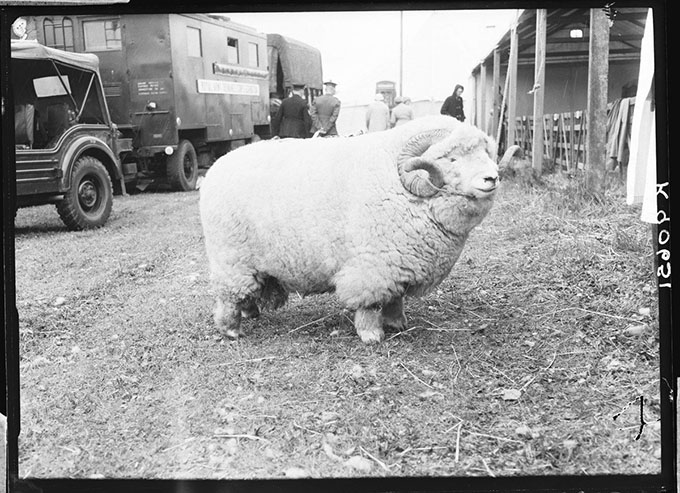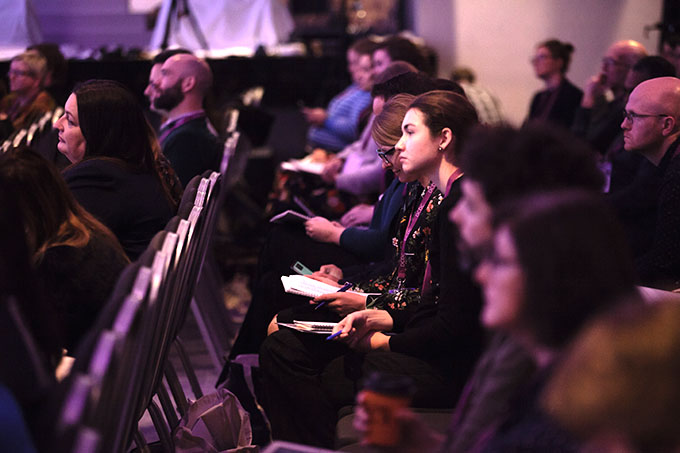In 2019 The National Archives awarded four bursaries to support students, early career professionals, and others who would otherwise not have been able to attend, to participate in Discovering Collections, Discovering Communities 2019 (DCDC19). DCDC is an annual conference for the archive, library and museum, and academic sectors, run in collaboration by The National Archives, Research Libraries UK (RLUK) and Jisc.
Here we share some of the bursary recipients’ reflections on the conference. If you missed DCDC19, or if you’d like to revisit some of the papers, go to dcdcconference.com, where you’ll find video of the keynotes and audio of some panel sessions.
Absolute unit

An ‘absolute unit’. Exmoor Horn aged ram, owned by G F Thorne, The Barton, Simonsbath, Minehead, Somerset (from the MERL collections)
Elliot Goodger, Development Officer at Nantwich Museum, gave us his highlights from DCDC19:
In April 2018, the Museum of English Rural Life in Reading tweeted the above image of an overweight sheep and other hilarious pictures from their photo archive. As a result, their followers on Twitter skyrocketed from a few thousand to more than 140,000. The ‘absolute unit’ post attracted visitors from all over the world and even created demand for merchandise. Their social media strategy was built around:
- Creating a strong identity and a tone that is friendly, relatable and humorous
- Adapting the museum’s content and activities to make it relevant to a wider online audience
- Promoting a culture of experimentation and trust
- Making the most of the part of their collection that was digitised
Elsewhere, Birmingham Museums Trust Collection Centre (the largest outside of London) has made its extensive digital image collection free for all, allowing anyone to use the best images of Birmingham, removing the red tape associated with acquiring the images. The image database can be found at www.birminghammuseums.org.uk/collection/picture-library.
The conference’s opening keynote speaker, Tonya Nelson, the first Director of Arts, Technology and Innovation at Arts Council England, talked about the challenges of using digital technology, posing such questions as:
- How can organisations work to help people navigate fake news and misinformation?
- Do our organisations know the rules on using data and collecting data about others?
- How do we process data and still respect privacy?
- How do we ensure we are transparent about our use of data?
As Nelson noted during her talk, ‘we now have the opportunity to have our own digital archives and so does everyone else. How do we manage that?’
In a panel on developing digital platforms, Scott Knight from the University of Wolverhampton discussed their ambitious project to digitise one million images from the Express & Star newspaper in Wolverhampton. They found that by engaging the public using photographs on social media, they received overwhelming support from local heritage groups, offering the public a platform to share memories and stories, and connect with each other. This public engagement further helps the archive, as it enables them to build more detailed information surrounding the images, including identifying the people in some of the photographs.
The clear message from the conference is that even the UK’s largest organisations are only just beginning their journeys towards transitioning to a digital world. Technology is bewildering to everyone until we have a go. We all need to just get stuck in and make it work for us, one step at a time.
I’ll certainly be hoping to replicate the social media storm that the Museum of English Rural Life achieved; I will be sharing as many images as possible through social media to encourage public engagement with the Nantwich Museum photo collection, and I hope to use Google Expeditions to make a VR learning tool. Thanks so much to the hosts of DCDC for giving me the tools and confidence to continue my journey in the virtual world.
Everything to everybody

The Book Rotunda at the Library of Birmingham
A librarian at a high school, undertaking a Library, Information and Archive Services Assistant Apprenticeship, shared these thoughts:
My visit to the DCDC conference in 2019 started with a trip to the Library of Birmingham where, to my delight, Shakespeare was waiting. In a pre-conference workshop, Tom Epps and Ewan Fernie gave an overview of the Everything to Everybody project. I had been unaware of the significance of the collection housed in the ‘top hat’ perched on top of the library building but was pleased to learn what a wonderful resource the Shakespeare Memorial Library is for the city.
My second full day consisted of an intellectual smorgasbord of talks, workshops and conversations. Questions abounded: Why should we consult communities about their ‘own’ archives? How do we ensure access for all? What are the benefits and challenges of managing the shift to digital archives? And what implications does this have for archives, libraries and museums?
Tonya Nelson (Arts Council England) and Liz Jolly (British Library) both gave thought-provoking speeches, and I spoke to Liz Jolly after her speech about her meditation on the professionalism and qualification routes for librarians – something of particular interest to me as an apprentice.
The final day began early with The National Archives’ ‘Breakfast Briefing’, led by Jeff James and Valerie Johnson. Lae’l Hughes-Watkins’ keynote, later in the day, offered her thought-provoking expressions of the experiences of marginalised communities and their missing narratives.
A visit to the exhibitors’ stands provided opportunities to look at the wide range of digital resources and applications available, to be discussed when I am back at my secondary school, where I am the librarian. On the long journey home my brain was buzzing with possible projects, queries, and research routes.
Inspirational keynote speakers

Attendees enjoying the inspirational keynote speakers
Lastly, Corinne Lewis, Archives Assistant at Gwent Archives, told us what most impressed her:
As a student of archive administration who’s currently working as an assistant in a county archive, the opportunity to attend DCDC19, funded through a bursary from The National Archives, was huge. There was no other way I would have been able to attend or have the chance to hear the thoughts of the leading players in this industry. Attending the conference really opened my eyes to the fullness of the information, heritage and culture sectors and allowed me to hear the thoughts of some of the leading people from the sector’s leading organisations.
I could feel the sincerity flow from Liz Jolly from The British Library, when she spoke about the need to include people from all sections of society, not only academics, in our work. Lae’l Hughes-Watkins’ keynote brought tears to my eyes. She spoke so powerfully about fairness and inclusion for everyone. Her family album analogy was both moving and thought-provoking: imagine yourself looking at your family album, a family which you were born into, supported and stood shoulder to shoulder with, in times of grief and disaster, who you rejoiced and celebrated with in times of triumph, but you find you are not in a single photograph, you are totally unrepresented. How would this feel?
Wherever we work, within this sector or more widely, there will be unrepresented or marginalised groups, and we have an obligation to do more to build trust and actively encourage these communities to use our services. Outreach plays a vital role and it is clear that managers who support outreach projects will be at the cutting edge of what the sector leaders now see as a requirement and a mandate. Lae’l is the University Archivist at the University of Maryland, and her keynote was the high point of DCDC19 for me.
We need to make contact!
One of the strongest takeaways from this conference for me was the need to make contact with those who may not feel welcome in our spaces, or that they are excluded from the history or culture of our country, when in fact they are the very people who have made our heritage so rich.
Digital tools and technologies can help us achieve this. Yet it appears there is still a great deal of uncertainty around technology in the culture and information sector. Some organisations are further along on this journey than others and this begs the question, how can smaller or county archives begin their digital journey, when even larger and better-funded organisations are struggling?
The answer, says Joanna Finegan, from the National Library of Ireland, is just to begin: we must take the first, tentative steps, choose small projects and learn as we go. Seems like very sensible advice to me! We must feel assured and be positive about learning the new skills we need to make the changes we have to make.
These messages build confidence. I felt reassured to know that everyone appears to be in the same boat: hopefully we will learn together as an industry and move forward to achieve both our digital and outreach goals. It was fantastic to discover at the conference that The National Archives is rolling out a programme of funded ‘digital schools’ that my organisation could sign up for.
The Power of Storytelling panel, which featured speakers from the RAF and the Scottish Book Trust, inspired me and I hope that my organisation will be able to use this vehicle to help us reach out to underrepresented sections of our community. The digital shift provides great opportunities, and it’s important to be positive and inspired, not hesitant and overwhelmed.